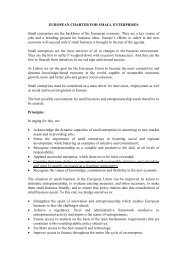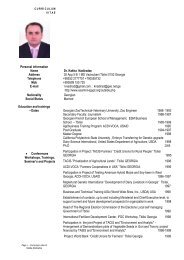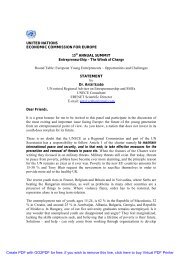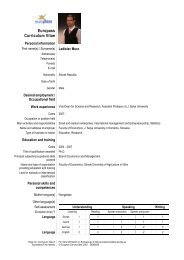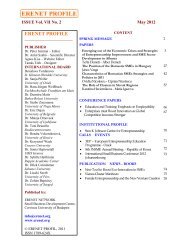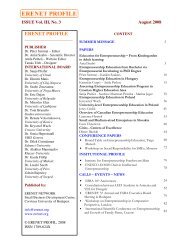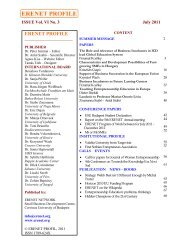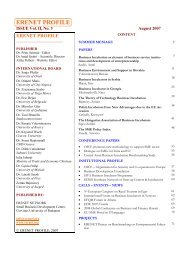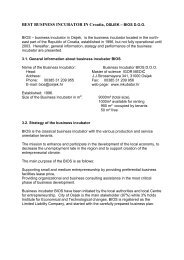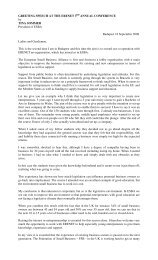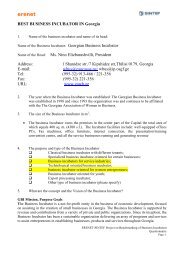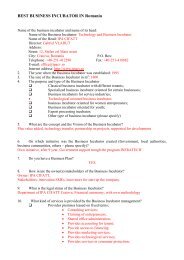Ano<strong>the</strong>r negative factor that is more aggressive in Russia than in Ukraine (in Ukraine itis stronger than in Moldova), is <strong>the</strong> lobbying <strong>of</strong> <strong>the</strong> large businesses <strong>and</strong> corporations <strong>of</strong> <strong>the</strong>irinterests on a governmental level.Political stability/instability is considered to be a positively affecting <strong>the</strong> development <strong>of</strong><strong>SME</strong> businesses in Russia (with some problems in <strong>the</strong> neighbouring with Chechnya regions),less but still positive in Moldova (some problems still occur between <strong>the</strong> political power <strong>and</strong>Transdnistria), <strong>and</strong> negatively affecting <strong>the</strong> <strong>SME</strong> sector in Ukraine, exactly <strong>the</strong> Ukrainianportion <strong>of</strong> a Black Sea Region. The Crimean people, especially minorities like Crimean Tatars,live under <strong>the</strong> unresting conditions <strong>of</strong> confrontation <strong>of</strong> political parties, ethnic conflicts, pressurefrom <strong>the</strong> large businesses. The situation is still vulnerable, <strong>and</strong> continues political crises on acountry level do not help <strong>the</strong> <strong>SME</strong> sector improvements in Ukraine.As far as <strong>the</strong> group <strong>of</strong> technological factors is involved, <strong>the</strong> Internet accessibility, hightechdevelopments, knowledge <strong>and</strong> information transfer infrastructure, time <strong>of</strong> technologyinnovation implementations, <strong>the</strong> state support <strong>of</strong> <strong>the</strong> idea <strong>of</strong> business incubators, willingness <strong>of</strong><strong>the</strong> banking <strong>and</strong> insurance industries to coop with <strong>SME</strong> sector on high-tech ideas have to beanalyzed. There is some insignificant variation in <strong>the</strong> status <strong>of</strong> <strong>the</strong>se factors in Russia, Moldova,<strong>and</strong> Ukraine. For example, because <strong>of</strong> <strong>the</strong> concentration <strong>of</strong> <strong>the</strong> high-tech industries primarily on<strong>the</strong> territory <strong>of</strong> Russian Federation <strong>and</strong> Republic <strong>of</strong> Ukraine in <strong>the</strong> socialist times, Moldova doesnot achieve yet <strong>the</strong> same level <strong>of</strong> technological developments. The Transparency InternationalWorld Year Book, 2006 proves <strong>the</strong> still a lower level <strong>of</strong> use <strong>of</strong> Internet in all <strong>of</strong> <strong>the</strong>se countriesin comparison with well developed economies. But <strong>the</strong>re is a difference in <strong>the</strong> situation, <strong>and</strong>Russia is leading <strong>the</strong> group. Needs to emphasize that <strong>the</strong> demographic trend <strong>of</strong> <strong>the</strong> increase <strong>of</strong><strong>the</strong> urban population would positively affect high-tech <strong>and</strong> o<strong>the</strong>r industries, but negativelyinfluence <strong>SME</strong> development in <strong>the</strong> agricultural sector. In <strong>the</strong> urban areas <strong>the</strong> use <strong>of</strong> Internet ishigher in times than <strong>the</strong> average for <strong>the</strong> country.Macroeconomic characteristics combining budget deficit or surplus, investment flow, <strong>the</strong>stability <strong>of</strong> <strong>the</strong> currency, trade deficit/surplus, inflation <strong>and</strong> <strong>the</strong> saving rates are ra<strong>the</strong>r differentin Russia, Ukraine <strong>and</strong> Moldova. By <strong>the</strong> World Bank st<strong>and</strong>ards Russia is considered to be amiddle-income country with a large <strong>and</strong> extremely well educated population (143 millionpeople, <strong>and</strong> a gross national income per capita <strong>of</strong> USD 4,460 in 2005. GNI, Atlas method, WDI-2006). The growth <strong>of</strong> <strong>the</strong> income is considered to be a strong positive factor for <strong>the</strong> <strong>SME</strong>development in Russia. Ukrainian <strong>and</strong> Moldova’s data show significantly lower characteristicsresulting in <strong>the</strong> lower consumer activity, <strong>and</strong> lower dem<strong>and</strong> for <strong>the</strong> <strong>SME</strong> products.Extremely fast growth <strong>of</strong> <strong>the</strong> oil prices resulted in <strong>the</strong> significant export revenueincrease in <strong>the</strong> last 5-6 years. The primary flow <strong>of</strong> <strong>the</strong> export revenues comes from naturalresources <strong>and</strong> large corporations, which are lobbing <strong>the</strong>ir interests effectively trying to block<strong>the</strong> raising competition from <strong>the</strong> <strong>SME</strong> sector. While this type <strong>of</strong> lobbying is present in <strong>the</strong> each<strong>of</strong> <strong>the</strong> researched countries, Russia is an example <strong>of</strong> <strong>the</strong> strongest positions <strong>of</strong> large business in<strong>the</strong> country’s economic hierarchy. Ano<strong>the</strong>r negative factor grows up from <strong>the</strong> formerlyinefficient structure <strong>of</strong> <strong>the</strong> Soviet Union economy, <strong>the</strong> central planning traditions, overconcentrationin <strong>the</strong> oil, gas <strong>and</strong> many o<strong>the</strong>r industries, which resulted in <strong>the</strong> lack <strong>of</strong> <strong>the</strong>attention to <strong>the</strong> <strong>SME</strong> problems, <strong>and</strong> underestimation <strong>of</strong> <strong>the</strong> <strong>SME</strong> sector potential. These couldbe considered as a strong negative factor for <strong>the</strong> <strong>SME</strong> development for every country in <strong>the</strong>trio. Ano<strong>the</strong>r stress for <strong>the</strong> <strong>SME</strong> sector is a NOT supportive taxation system (even <strong>the</strong>governmental <strong>of</strong>ficials are stressing it out that it is very light for <strong>the</strong> small companies) <strong>and</strong>incredible scale <strong>of</strong> corruption that pushes <strong>the</strong> <strong>SME</strong> sector down to hide <strong>the</strong> pr<strong>of</strong>it <strong>and</strong> join <strong>the</strong> socalled “gray” or “shadow” economy.The investment climate is improving slightly better in Russia ra<strong>the</strong>r than in Ukraine, <strong>and</strong><strong>the</strong>n Moldova. Interestingly, <strong>the</strong> international foundations <strong>and</strong> <strong>the</strong> EU commissions pay moreattention to <strong>the</strong> <strong>SME</strong> developments in <strong>the</strong> region than international corporations investing68
primarily in large companies in gas <strong>and</strong> oil industry, <strong>and</strong> again large machine-building, <strong>and</strong>chemical corporations. The upper scale interest <strong>of</strong> international investors is seen to <strong>the</strong> largefood companies <strong>of</strong> all <strong>the</strong> trio countries. Not only economic situation <strong>and</strong> political stability butcountry’s capacity for cooperation with <strong>the</strong> neighbors, <strong>and</strong> fundraising on international marketwould contribute to <strong>the</strong> growth <strong>of</strong> <strong>the</strong> investment opportunities for <strong>the</strong> <strong>SME</strong> sector. The firsttwo factors are <strong>the</strong> most favorable for Russia, but Ukraine, <strong>and</strong> <strong>the</strong>n Moldova are leading inregard to <strong>the</strong> third one. In <strong>the</strong> framework <strong>of</strong> our research we would consider <strong>the</strong> growinginternational investment opportunities to be more valuable in future but at <strong>the</strong> current stage <strong>of</strong><strong>the</strong>se transition economies’ development not significantly affecting <strong>the</strong> countries’ situation in<strong>SME</strong> sector. The domestic financing opportunities for <strong>SME</strong> businesses are seen as more critical.The interviews with <strong>the</strong> leading countries’ authorities prove <strong>the</strong> underst<strong>and</strong>ing <strong>of</strong> a need forincreasing <strong>the</strong> <strong>SME</strong> sector financing opportunities trough <strong>the</strong> private banks, variousfoundations, corporations, <strong>and</strong> even budget funds. But <strong>the</strong> sources used vary a lot. Analyzingcurrent situation we would state that <strong>the</strong>re some very light signals <strong>of</strong> <strong>the</strong> change <strong>of</strong> economicpolicy in Russia towards <strong>the</strong> increasing independence <strong>of</strong> <strong>the</strong> economy from <strong>the</strong> oil <strong>and</strong> gasprices on international market, <strong>and</strong> more attention <strong>of</strong> <strong>the</strong> state to <strong>the</strong> <strong>SME</strong> sectordevelopments. On 24 October 2007, <strong>the</strong> new Chief <strong>of</strong> <strong>the</strong> Russian Federal Ministry <strong>of</strong> Economic<strong>Development</strong> <strong>and</strong> Trade, Elvira Nabiullina, has stressed out that <strong>the</strong> goal is to increase <strong>the</strong>number <strong>of</strong> <strong>SME</strong> start ups from around 50,000 per year to 100,000 in 3 years. This ambiguousgoal could be achieved by <strong>the</strong> combined efforts on local, municipal, <strong>and</strong> state levels byneutralizing <strong>the</strong> negative factors, building on positively affecting <strong>the</strong> small businesses, <strong>and</strong>preparing <strong>the</strong> basis for <strong>the</strong> fur<strong>the</strong>r involvement <strong>of</strong> <strong>the</strong> currently neutral factors. There is a hopebased on this data that at least Russia is entering <strong>the</strong> o<strong>the</strong>r stage <strong>of</strong> its economic developmentby gradual switching from “large corporations” economy to <strong>the</strong> growth through <strong>SME</strong> sector. Thenumber <strong>of</strong> researchers, criticizing Moldova, Ukraine, <strong>and</strong> primarily Russia for <strong>the</strong> lack <strong>of</strong>support for <strong>the</strong> so called “balanced” model <strong>of</strong> economic growth, probably do not take in <strong>the</strong>account <strong>the</strong> enormous problems raised in <strong>the</strong>se countries after <strong>the</strong> crash <strong>of</strong> <strong>the</strong> integratedSoviet Economy. The economic crises put <strong>the</strong> countries’ abilities to experiment on growthmodels down, <strong>and</strong> focused all <strong>of</strong> <strong>the</strong>m on <strong>the</strong> largest possible revenues in a short term. Themanagement in a severe crisis does not support <strong>the</strong> long term oriented activities before <strong>the</strong>survival is not questionable. The image <strong>of</strong> reorientation towards <strong>the</strong> “balanced” economy wouldbring Russia incredible benefits (if it would be consistent enough in building this imageinternationally <strong>and</strong> domestically). In comparison with <strong>the</strong> o<strong>the</strong>r 2 countries <strong>of</strong> <strong>the</strong> trio, Russiahas an extraordinary favorable potential factor which would positively affect <strong>the</strong> investing <strong>of</strong><strong>SME</strong> businesses.The last group <strong>of</strong> factors presents an international <strong>and</strong> global trends <strong>and</strong> <strong>the</strong>ir influenceover <strong>the</strong> country’s developments in <strong>SME</strong> sector. The major one is an international competitionin <strong>the</strong> area <strong>of</strong> <strong>SME</strong> products, where China is suppressing <strong>the</strong> o<strong>the</strong>r emerging <strong>and</strong> transitioningeconomies. International integration, especially in <strong>the</strong> European region, facilitates <strong>the</strong> positivetrends for each group <strong>of</strong> factors but increases <strong>the</strong> competition as well. All <strong>of</strong> <strong>the</strong>se 3 countriesat <strong>the</strong> very first stages <strong>of</strong> transition to <strong>the</strong> market economies were pursuing <strong>the</strong> strictprotectionist policy changing with <strong>the</strong>ir more extensive cooperation through <strong>the</strong> WTO.Interestingly, protectionist position <strong>of</strong> all <strong>the</strong> three countries was not so strong in relation to <strong>the</strong>products/services <strong>of</strong> <strong>SME</strong> sector (excluding agriculture) as in <strong>the</strong> in <strong>the</strong> industries traditionallyrepresented by large businesses. The global competition is a significant pushy factor from oneh<strong>and</strong>, <strong>and</strong> a strong down holding factor for <strong>the</strong> underdeveloped <strong>SME</strong> sectors from ano<strong>the</strong>r one.International business <strong>the</strong>ory states that <strong>the</strong> negative effect <strong>of</strong> global competition at <strong>the</strong> veryfirst stages <strong>of</strong> <strong>the</strong> lifecycle <strong>of</strong> <strong>the</strong> organization/industry/sector <strong>of</strong> <strong>the</strong> economy development ismuch stronger, while it turns into a positive side later.With <strong>the</strong> growing opportunities <strong>of</strong> <strong>of</strong>fshoring <strong>and</strong> outsourcing <strong>the</strong> <strong>SME</strong> sector could boost <strong>the</strong>countries’ economy in several years. The key for success is <strong>the</strong> country’s legislative <strong>and</strong>political openness, educational <strong>and</strong> technology development level, liberalization <strong>of</strong> <strong>the</strong>69
- Page 4 and 5:
1. SME DECLARATION AND WORKING GROU
- Page 6 and 7:
While comparing the BSEC and EU doc
- Page 8 and 9:
cooperation with the United Nations
- Page 10 and 11:
GENERAL ASSESSMENT OF THE BSEC WG O
- Page 12 and 13:
“Armenia's new law introduces a n
- Page 14 and 15:
(iii)Share of the labor force of SM
- Page 16 and 17:
The following data represents some
- Page 18 and 19: RankDocuments for export(number)Tra
- Page 20 and 21: • Industrial zones/Business incub
- Page 22 and 23: 3.1.4. FINANCING SMEsProf. Dr. Sela
- Page 24 and 25: • the loan is secured with movabl
- Page 26 and 27: 3.1.4.3. Mutual and loan guarantee
- Page 28 and 29: introduction of e-signatures, only
- Page 30 and 31: The Code of Conduct for Civil Serva
- Page 32 and 33: Trading Across Borders Enforcing Co
- Page 34 and 35: as with all non-governmental organi
- Page 36 and 37: Bulgarian SMEs obtain additional ca
- Page 38 and 39: • Project BG 2004/016-711.11.04 -
- Page 40 and 41: usiness is not approaching them oft
- Page 42 and 43: • Romanian citizens are recognize
- Page 44 and 45: The preparatory project of the NDP
- Page 46 and 47: • To support participation in eco
- Page 48 and 49: In 2004, the National Institute of
- Page 50 and 51: Incubators host on average 11 SME,
- Page 52 and 53: Programs. The program is implemente
- Page 54 and 55: development instrument is extremely
- Page 56 and 57: accounting standards, including med
- Page 58 and 59: corporations and open held corporat
- Page 60 and 61: promoting SME sector, cooperation w
- Page 62 and 63: • for unemployed (micro credit)
- Page 64 and 65: are private pension funds, broker h
- Page 66 and 67: very early steps of its democratic
- Page 70 and 71: economy. The so called in the organ
- Page 72 and 73: Federal funds, private capital, esp
- Page 74 and 75: 4.3. MOLDOVATable 14.Dimensions Neg
- Page 76 and 77: Related andsupportingindustriesDome
- Page 78 and 79: Technological:Internetaccessibility
- Page 80 and 81: Domesticdemand• Still not many pe
- Page 82 and 83: international investments• Govern
- Page 84 and 85: 3. Hamel, G., Prahalad, C.K. (1994)
- Page 86 and 87: 5.2 DEVELOPMENT OF THE SME SECTOR I
- Page 88 and 89: General Characteristic of SME Devel
- Page 90 and 91: Index of SME Development in Armenia
- Page 92 and 93: The same problem exists in getting
- Page 94 and 95: SME support infrastructure in Armen
- Page 96 and 97: 5 million was provided by UNDP and
- Page 98 and 99: 5.3 DEVELOPMENT OF THE SME SECTOR I
- Page 100 and 101: Diagram 1. The number of small ente
- Page 102 and 103: The privatization process of object
- Page 104 and 105: 13.Cabinet Provision on “Distribu
- Page 106 and 107: 5.3.3. SME support infrastructure i
- Page 108 and 109: The role of the state in technical
- Page 110 and 111: General situation of credit marketT
- Page 112 and 113: After creation and starting impleme
- Page 114 and 115: At the meantime, small enterprise s
- Page 116 and 117: Table. 32.Ease of businessDoingBusi
- Page 118 and 119:
people who start small businesses t
- Page 120 and 121:
are salaried and the medium - sized
- Page 122 and 123:
Technology Foresight in Greece 2001
- Page 124 and 125:
Greek VC market started to develop
- Page 126 and 127:
In the area of bankruptcy and restr
- Page 128 and 129:
enterprises. According to TURKSTAT,
- Page 130 and 131:
small size enterprise or micro ente
- Page 132 and 133:
industrial enterprises. Undersecret
- Page 134 and 135:
individuals, rather than well struc
- Page 136 and 137:
7. SUGGESTIONS FOR THE SME DEVELOPM
- Page 138 and 139:
Annex 1.MAP OF THE BLACK SEA COUNTR
- Page 140 and 141:
17-18 June 2005 1 st Moscow Interna
- Page 142 and 143:
ARMENIASTRENGTHS• Application of
- Page 144 and 145:
BULGARIASTRENGHT• Flexibility and
- Page 146 and 147:
GREECESTRENGHT• They have a vital
- Page 148 and 149:
ROMANIASTRENGHTWEAKNESS• Stabilis
- Page 150 and 151:
REPUBLIC OF SERBIASTRENGHT• Longe
- Page 152 and 153:
UKRAINESTRENGTHS• Well educated l
- Page 154 and 155:
In compliance with the Resolution m
- Page 156 and 157:
1. Please provide definition of SME
- Page 158 and 159:
7. Did you establish a dedicated bo
- Page 160:
11. Do you have any suggestions for



